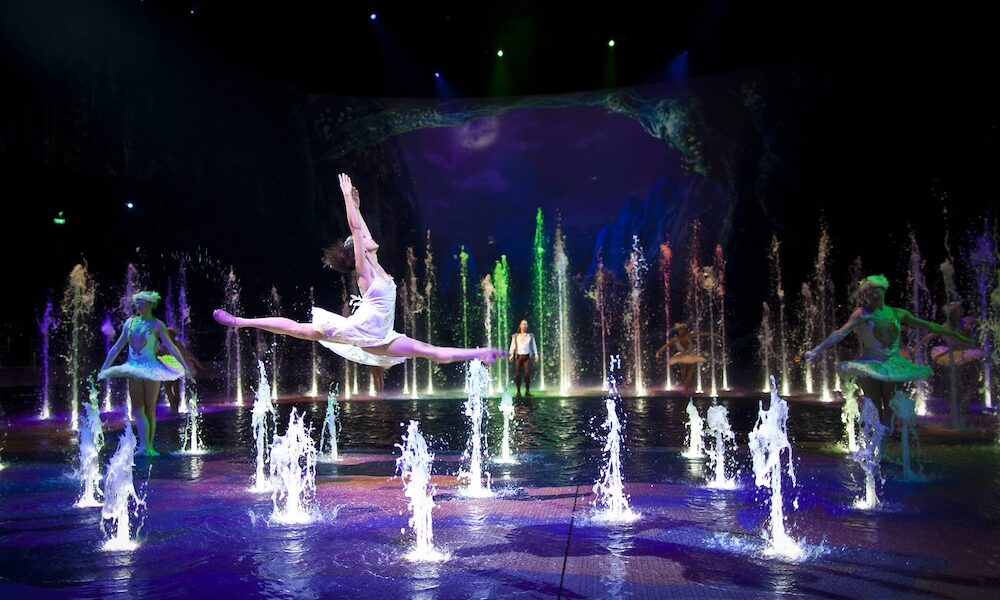Thousands of miles apart, Melco Resorts & Entertainment and Penn Entertainment share an idea. Both are bringing back something from the days before COVID-19. Melco is reopening its $40 million show, The House of Dancing Water. Penn’s Boomtown Casino Biloxi on Mississippi’s Gulf Coast is reopening its buffet and welcoming families.
The House of Dancing Water at the City of Dreams in Macau has been closed for five years. The show opened in 2010 and was performed 3,800 times in front of two million people between 2010 and 2020. When the casinos in Macau opened again after the pandemic closure, in the City of Dreams, the dancing waters did not dance. When the casinos were allowed to open, it was under regulatory and travel restrictions that kept the gamblers in China at home. In the new environment, Melco struggled to regain its footing and profits. But things are looking better and Melco, like the other operators in Macau, is under a contractual obligation to diversify away from gaming. So let the waters dance!
In Biloxi, the story is not so different. In the wake of the nationwide shutdown of casinos, they reopened under restrictions. Casinos in Mississippi were closed for two months in 2020, from March to May. On May 21, when the casinos reopened, it was the second jurisdiction permitted to do so. Casinos were expected to maintain social distancing and do frequent cleaning, while half of the slots were closed. The model was followed, if not in detail, at least in concept, everywhere.
Management across the industry used the down time to assess their business. With the advantage of restricted operations, every expense could be evaluated as an independent variable. Buffets were on the top of the list. Operators could see the impact of the buffet more clearly when they were closed. Many never reopened or, like Boomtown, waited a very long time.
The Boomtown buffet was part of a national trend. Red Rock Resorts, a.k.a. Station Casinos, in Las Vegas was the poster child for deep introspection after COVID. Station did not reopen three casinos; instead, it has embarked on a new program with new business models in new neighborhoods. The first new casino under the plan was Durango. Built at a cost of $780 million, it is by all accounts a success. Red Rock Resorts says the property is still ramping up and will continue to grow, aided by an expected 34,000 new residents in Summerlin. Station is expanding Durango to meet that demand. The corporation is also reinvesting $200 million in two of its older properties. It is all part of the post pandemic plan, while buffets are not.
It has been five years since COVID-19 escaped from China and spread across the world. Every country and every economy suffered and reacted with like measures: closing businesses, establishing new health policies, and restricting activities. Each country, or in the case of the United States each state, initiated its own policies. Those policies have run their course and the world has returned to normal routines — except where it has not.
An essay by Scott Fulford published by the Princeton University Press says the “biggest pandemic economic surprise was how quickly the economic collapse disappeared.” Fulford compared the pandemic to the Great Recession, about which he says, “The U.S. never recovered from the Great Recession, which permanently lowered GDP per person.” By contrast, after COVID, the economy seemed to bounce back very quickly. Gaming can certainly attest to that, as it has grown steadily since 2020, setting revenue records year after year.
That trend of record revenues is slowing and may even reverse this year. But it was a great run. In part, the records are the result of Red Rock thinking, new things in new places. Red Rock abandoned three casinos and opened one new one. Illinois demonstrates the trend. It has six new casinos since 2020. Casino revenue for January was up from $100 million in 2020 to $144 million in 2025. The state also added 14,000 video lottery terminals since 2020. The VLTs generated $288 million in January, up from $142 million in January 2020. The revenue growth in the Land of Lincoln is from new product; existing casinos made less in January 2025 than in 2020.
Of course, there are also the two elephants in the room, sports betting and igaming. In 2024, Elephant One, sports betting, produced $13.5 billion in revenue and $147 billion in wagers in 2024; 33 states reported sports revenue. Elephant Two produced $7.9 billion in revenue; it was legal in seven states. As with the Illinois example in January, if the new product is subtracted from the total, the existing operations are not doing better than in 2019.
That is the dancing buffet lesson. Things may look the same as they did before covid hit, but if you look below the surface, there are some very big differences. More of us buy online, have food delivered, stream movies and television, work from home, and go out less often. There are fewer buffets, but an endless stream of new restaurants with creative new menus. And for the nostalgic among us, there are the dancing waters in Macau and a buffet in Biloxi.


